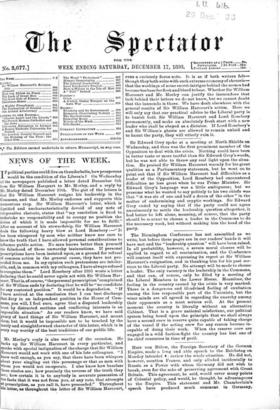Mr. Morley's reply is also worthy of the occasion. He
backs up Sir William Harcourt in every particular, and licaks with special indignation of the charge that Sir William Harcourt would not work with one of his late colleagues. "I blow well enough, as you say, that there have been whispers ebotet your singling out this personage or that as men with horn you would not co-operate. I also know how baseless ,hese stories are; how precisely the reverse of the truth they Ire; how certain it is to anybody in accurate possession of le facts that it was not from you, at any rate, that attempts Lt proscription, as you call it have proceeded." Throughout kis letter, as throughout the letter of Sir William Harcourt, runs a curiously fierce note. It is as if both writers felt—, though they both write with such extreme economy of rhetoric—. that the workings of some secret intrigue behind the scenes had become too base for flesh and blood to bear. Whether Sir William Harcourt and Mr. Morley can justify the innuendoes that lurk behind their letters we do not know, but we cannot doubt that the innuendo is there. We have dealt elsewhere with the general results of Sir William Harcourt's action. Here we will only say that our practical advice to the Liberal party is to banish both Sir William Harcourt and Lord Rosebery permanently, and make an absolutely fresh start with a new leader who shall be obeyed as a dictator. If Lord Rosebery's and Sir William's ghosts are allowed to remain unlaid and to haunt the party, they will utterly ruin it.










































